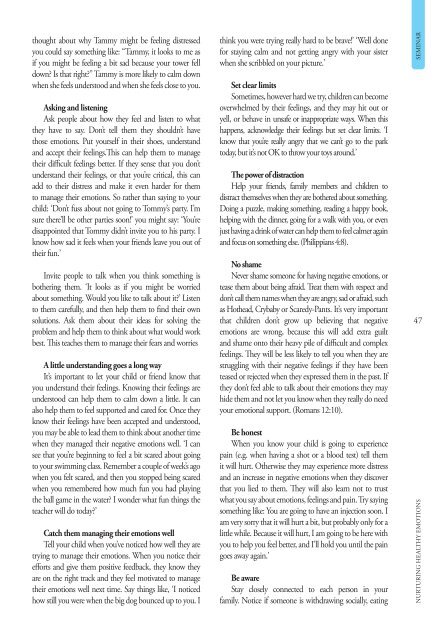HEALTHY FAMILIES FOR ETERNITY
FM_Planbook%202016-eng
FM_Planbook%202016-eng
Create successful ePaper yourself
Turn your PDF publications into a flip-book with our unique Google optimized e-Paper software.
thought about why Tammy might be feeling distressed<br />
you could say something like: “Tammy, it looks to me as<br />
if you might be feeling a bit sad because your tower fell<br />
down? Is that right?” Tammy is more likely to calm down<br />
when she feels understood and when she feels close to you.<br />
Asking and listening<br />
Ask people about how they feel and listen to what<br />
they have to say. Don’t tell them they shouldn’t have<br />
those emotions. Put yourself in their shoes, understand<br />
and accept their feelings.This can help them to manage<br />
their difficult feelings better. If they sense that you don’t<br />
understand their feelings, or that you’re critical, this can<br />
add to their distress and make it even harder for them<br />
to manage their emotions. So rather than saying to your<br />
child: ‘Don’t fuss about not going to Tommy’s party. I’m<br />
sure there’ll be other parties soon!’ you might say: ‘You’re<br />
disappointed that Tommy didn’t invite you to his party. I<br />
know how sad it feels when your friends leave you out of<br />
their fun.’<br />
Invite people to talk when you think something is<br />
bothering them. ‘It looks as if you might be worried<br />
about something. Would you like to talk about it?’ Listen<br />
to them carefully, and then help them to find their own<br />
solutions. Ask them about their ideas for solving the<br />
problem and help them to think about what would work<br />
best. This teaches them to manage their fears and worries<br />
A little understanding goes a long way<br />
It’s important to let your child or friend know that<br />
you understand their feelings. Knowing their feelings are<br />
understood can help them to calm down a little. It can<br />
also help them to feel supported and cared for. Once they<br />
know their feelings have been accepted and understood,<br />
you may be able to lead them to think about another time<br />
when they managed their negative emotions well. ‘I can<br />
see that you’re beginning to feel a bit scared about going<br />
to your swimming class. Remember a couple of week’s ago<br />
when you felt scared, and then you stopped being scared<br />
when you remembered how much fun you had playing<br />
the ball game in the water? I wonder what fun things the<br />
teacher will do today?’<br />
Catch them managing their emotions well<br />
Tell your child when you’ve noticed how well they are<br />
trying to manage their emotions. When you notice their<br />
efforts and give them positive feedback, they know they<br />
are on the right track and they feel motivated to manage<br />
their emotions well next time. Say things like, ‘I noticed<br />
how still you were when the big dog bounced up to you. I<br />
think you were trying really hard to be brave!’ ‘Well done<br />
for staying calm and not getting angry with your sister<br />
when she scribbled on your picture.’<br />
Set clear limits<br />
Sometimes, however hard we try, children can become<br />
overwhelmed by their feelings, and they may hit out or<br />
yell, or behave in unsafe or inappropriate ways. When this<br />
happens, acknowledge their feelings but set clear limits. ‘I<br />
know that you’re really angry that we can’t go to the park<br />
today, but it’s not OK to throw your toys around.’<br />
The power of distraction<br />
Help your friends, family members and children to<br />
distract themselves when they are bothered about something.<br />
Doing a puzzle, making something, reading a happy book,<br />
helping with the dinner, going for a walk with you, or even<br />
just having a drink of water can help them to feel calmer again<br />
and focus on something else. (Philippians 4:8).<br />
No shame<br />
Never shame someone for having negative emotions, or<br />
tease them about being afraid. Treat them with respect and<br />
don’t call them names when they are angry, sad or afraid, such<br />
as Hothead, Crybaby or Scaredy-Pants. It’s very important<br />
that children don’t grow up believing that negative<br />
emotions are wrong, because this will add extra guilt<br />
and shame onto their heavy pile of difficult and complex<br />
feelings. They will be less likely to tell you when they are<br />
struggling with their negative feelings if they have been<br />
teased or rejected when they expressed them in the past. If<br />
they don’t feel able to talk about their emotions they may<br />
hide them and not let you know when they really do need<br />
your emotional support. (Romans 12:10).<br />
Be honest<br />
When you know your child is going to experience<br />
pain (e.g. when having a shot or a blood test) tell them<br />
it will hurt. Otherwise they may experience more distress<br />
and an increase in negative emotions when they discover<br />
that you lied to them. They will also learn not to trust<br />
what you say about emotions, feelings and pain. Try saying<br />
something like: You are going to have an injection soon. I<br />
am very sorry that it will hurt a bit, but probably only for a<br />
little while. Because it will hurt, I am going to be here with<br />
you to help you feel better, and I’ll hold you until the pain<br />
goes away again.’<br />
Be aware<br />
Stay closely connected to each person in your<br />
family. Notice if someone is withdrawing socially, eating<br />
SEMINAR<br />
47<br />
NURTURING <strong>HEALTHY</strong> EMOTIONS


